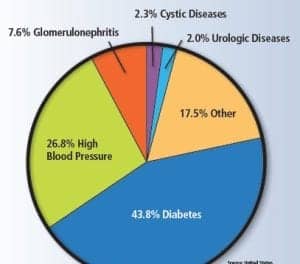Combined results from subset analyses of the Tiger-X and Tiger-2 clinical trials show that the VeriStrat test from Biodesix, Boulder, Colo, stratifies T790M-mutated patients with previously treated, advanced non-small cell lung cancer (NSCLC) who are more or less likely to experience longer progression-free survival (PFS) when treated with a third-generation epidermal growth factor receptor tyrosine kinase inhibitor (EGFR-TKI) therapy.
Biodesix’s VeriStrat test is a predictive and prognostic blood-based proteomic test for patients with advanced NSCLC. The test is used to assess disease aggressiveness by characterizing host response to the tumor, classifying patients as either VeriStrat-good (VS-G) or VeriStrat-poor (VS-P). The test has previously been shown to predict survival outcomes for patients with advanced NSCLC treated with erlotinib.1 VeriStrat test results are available to ordering physicians within 72 hours.
EGFR mutation status is known to identify patients with NSCLC who experience significantly better outcomes on EGFR-TKI therapy versus standard platinum-doublet therapy in a front-line setting.2 However, a subset of patients will have de novo resistance, and acquired resistance is expected for all patients. The EGFR T790M mutation is the mechanism of resistance at progression in as much as 60% of NSCLC patients.
For the Tiger-X and Tiger-2 clinical trials, all patient samples in the cohort analyzed by the VeriStrat test were confirmed as being T790M mutation-positive by tissue testing prior to enrollment. VS-G or VS-P results were obtained for 230 patient samples, and the post hoc analysis examined clinical outcomes with respect to the VeriStrat status.
The patient population for which VeriStrat test results were reported had a median progression-free survival of 127 days (163 events reported for 232 patients with VeriStrat test results). Additionally, PFS was analyzed for patients who had an Eastern Cooperative Oncology Group (ECOG) score of 0 (63 patients; median 169 days) or 1 (169 patients; 125 days) and was found to have a hazard ratio of 0.85 (p value = 0.37).
Analyses were performed comparing VeriStrat good and poor test status for the entire T790M mutation-positive patient pool, for second-line patients alone, and for third- and higher-line patients alone. For the entire cohort, median PFS was 168 days for VS-G patients versus 91 days for VS-P patients. For the second-line cohort, median PFS was 127 days for VS-G patients versus 43.5 days for VS-P patients. For the third- and higher-line cohort, median PFS was 165 days for VS-G patients versus 106 days for VS-P patients.
An additional analysis was performed to investigate VeriStrat test status versus ECOG performance status. For ECOG status 1 patients, VeriStrat further stratified patients by median PFS: 153 days for VS-G patients versus 102 days for VS-P patients. The hazard ratio was 0.50 (p value = 0.0002).
These data are the first reported results from the VeriStrat test on advanced NSCLC patients who are T790M mutation-positive. For more information, visit Biodesix.
REFERENCES
- Gregorc V, Novello S, Lazzari C, et al. Predictive value of a proteomic signature in patients with non-small-cell lung cancer treated with second-line erlotinib or chemotherapy (PROSE): a biomarker-stratified, randomized phase 3 trial. Lancet Oncol. 2016;15(7):713–721; doi: 10.1016/S1470-2045(14)70162-7.
- Fukuoka M, Wu YL, Thongprasert S, et al. Biomarker analyses and final overall survival results from a phase 3, randomized, open-label, first-line study of gefitinib versus carboplatin/paclitaxel in clinically selected patients with advanced non-small cell lung cancer in Asia (IPASS). J Clin Oncol. 2011;29(21):2866–2874; doi: 10.1200/JCO.2010.33.4235.



